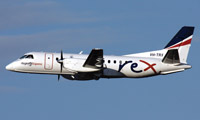Executive Interview
Rex defies the odds
The Australian regional carrier’s chairman, Lim Kim Hai, has introduced flexibility and diversification to Rex, which has resulted in record profits. But he reveals he never makes long-term plans
October 1st 2012
The 55-year-old Singaporean executive chairman of Australia’s Regional Express, or Rex as it is better known, Lim Kim Hai, rarely plans beyond six months. Read More »
 |
| 'I am one businessman who doesn’t have either a long-term plan or any long-term ambitions' |
| Lim Kim Hai Executive Chairman Rex |
“I must admit, I am one businessman who doesn’t have either a long-term plan or any long-term ambitions,” he said. “All I focus on is doing the job better every day.
“I believe in doing what we do well, being well organized and when there is an opportunity being in a very good position to respond. But I am probably a failure as an entrepreneur because I don’t have plans.”
Few would agree with him, particularly after the airline’s latest financial results. In the year ended June 30, Rex, which celebrated its 10th anniversary last month, reported a record profit before tax of A$35.1 million (US$35.8 million), making it the most profitable listed airline in Australia.
“Even as almost every blue ribbon legacy airline in the world, be it Singapore Airlines, Air France, Lufthansa, Emirates or Qantas, reported profits plunging more than 60%, or even had losses, I feel humbled that Rex ended the financial year with a record 45.6% increase in profit.”
Today, Rex operates a fleet of 95 turboprop aircraft, with 51 Saab 340s the mainstay of its operations. The remainder is a mix of various sized planes, from a Brasilia 120 used for freight, to 19-seat Beechcraft 1900Ds and two to three seat Piper Warriors and Seminoles.
It has two regional subsidiaries, air freight and charter operator, Pel-Air Aviation, and Dubbo-based regional carrier, Air Link.
Lim warned the current year will be tougher and less profitable. There are no plans for fleet expansion.
The Rex chief is no stranger to major challenges. Rex was born out of turmoil, when a group of Singapore and Australian investors, including Lim, bought regional operators, Kendell Airlines and Hazelton Airlines, in 2001.
 |
| Rex: bucking the trend with record profits |
They were subsidiaries of Ansett Airlines, which collapsed the same year. Re-branded as Rex and launched in 2002, it lost $35 million in its first year of operations. It needed another capital injection to stay afloat.
At last month’s anniversary celebrations, held at the airline’s base in Wagga Wagga, Saab Aircraft Leasing president and chief executive, Michael Magnusson, who had flown in from Seattle for the occasion, disclosed the situation was so bad the Swedish company was on the verge of repossessing its aircraft.
Rex received a last minute reprieve when 55-year-old Lim, and another Singaporean partner, pumped a further $5-$6 million into the airline. A confidentiality clause means the chairman is unable to reveal the initial investment, but Lim is the largest shareholder with a stake of more than 20%. Based in Singapore, he remains a hands-on chairman with his Australian airline.
Rex crept back into profit in 2003, but as well as difficult trading conditions there was more drama to come. As big airlines went through another cycle of expansion in 2008 they began poaching cockpit crew from the regional carriers. Rex lost half its pilots in a year, which resulted in network cuts and flight cancellations.
That experience continues to haunt Lim. And that is the reason why Rex launched its own pilot training facility, the Australian Airline Pilot Academy, at Wagga Wagga.
“Pilot shortages remain a problem at times,” he said. “It is the one area where we could have a collapse of the airline when there’s a confluence of the external environment. That’s the reason we started the academy. It is a defensive measure.
“We have a good airline business, but that could disappear within six months if there was a repeat of 2008.”
Lim is close to ensuring Rex is protected against that scenario. Some 100 cadet pilots – they have to stay with the airline for seven years - have graduated from the academy and are part of the airlines 250-strong cockpit crew roster.
“More importantly, by the end of this year the first cadets will have graduated to captains. From that point on I will have a steady stream of captains coming into our ranks,” he said.
“That will help us ensure we are sheltered from these crises that erupt from time to time. We know there is a build-up of capacity in Australia and we know that will perhaps hit us again in 12 months. We are making sure that whatever happens externally we have a high degree of stability within the airline.”
Lim said several factors had contributed to the Rex group’s success. “In the last 10 years, we have worked very hard in all areas of our operations. We have put a huge effort into making ourselves efficient and extremely productive.
“That has resulted in a cost base that is really low and helped to shelter us a little from the external pressures of price increases,” he said.
It has helped that Rex is a diversified airline group. Apart from its regular public transport operations – some 1,300 weekly flights to 35 destinations in five states – the airline is making money from its air ambulance work, defence contracts, fly-in-fly-out operations (flying workers to and from mining operations on contract), freight and its pilot academy.
In the midst of Australia’s natural resources boom, Rex has found fly-in-fly-out operations lucrative. “While we know there is a general slow-down in this resource boom due to world economic conditions, we have found that the momentum continues,” said Lim.
As for the not-so-rosy prospects for the current year, there are good reasons why Rex may struggle to maintain the same level of profitability. It has been hit by a “triple whammy” of costs by government, all of which took effect from July 1: Australia’s new carbon tax on aviation, additional security charges at regional airports and the removal of an En-route Rebate Scheme. The combined effect on Rex is about $4-$5 million a year off the bottom line.
To counter some of this, Lim said the carrier will pursue its “relentless internal initiative” to reduce costs. It has a productivity committee, now in its ninth year, which annually looks at the sustainable productivity initiatives that can be achieved.
“We are still finding sustainable gains – last year it was about $4 million – but on average we are achieving $2-$3 million of gains every year,” he said.
“That surprises me because I thought once we had collected all the low-hanging fruit it would be harder and harder to squeeze out additional efficiencies. But it still goes on and I am confident that even in this current year we will be hitting our average gains.
“I believe that Rex can survive the [possible] cataclysmic period ahead just as we have survived the last decade of droughts, Middle Eastern wars, SARS, fuel price escalations, pilot shortages, the GFC (global financial crisis), volcanic ash and the Euro zone crisis.
“Our fundamentals are solid with no debt burden. However, our profits are expected to drop by 15%-25% in the current financial year.”